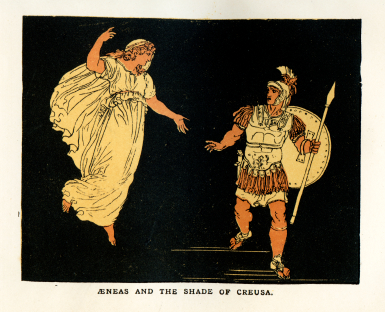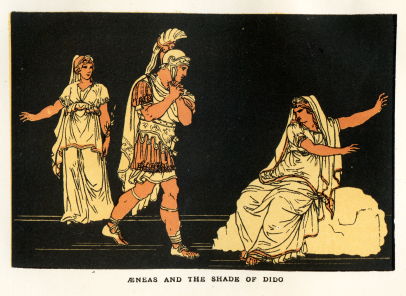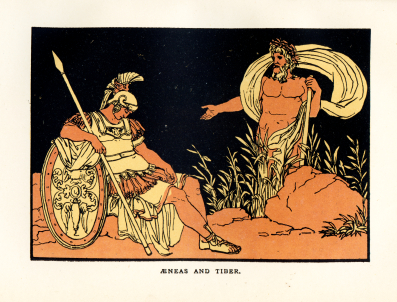
EPIC POETRY: VIRGIL
Unit Overview
Publius Vergilius Maro was a Roman poet, and he is best known for three major works: the Eclogues, the Georgics and the Aeneid. Of these the Aeneid is the most well-read of his works, and it is considered the Roman national epic.
The Aeneid
Virgil began writing The Aeneid around 30 BC. He died before completing it, and he didn’t like the poem very much. He gave strict instructions to his friends to burn it after his death! Thankfully, his friends did not follow these instructions. They read the poem and realized that it was very good. Fortunate for us, they were able to preserve his poem and share it with the world. Today, there are many English translations of The Aeneid from the original Latin it was composed in. Take a look at the first 12 lines as translated by Robert Fitzgerald:
| Sing Muse of warfare and a man at war. From the sea-coast of Troy in early days He came to Italy by destiny, To our Lavinian western shore, A fugitive, this captain, buffeted Cruelly on land as on the sea By blows from powers of the air- behind them Baleful Juno in her sleepless rage. And cruel losses were his lot in war, Till he could found a city and bring home His gods to Latium, land of the Latin race, The Alban lords, and the high walls of Rome. |
Epic Poems: A Review
An epic or heroic poem is a long, narrative poem with a serious subject. In the case of the Aeneid, the subject is the founding of Rome. Like other epics, it is written in an elevated style and centered on a larger than life hero.
Epics also tend to open with an invocation to the Muse. Did you spot it in the passage above? The story also opens in medias res. What does that mean? It’s a Latin term that literally means “in the middle of things.” The story does not start at the very beginning, but somewhere in the middle. Usually, this is at some crucial point in the action. Epics also contain within their narratives the intervention of supernatural figures, like gods and goddesses.
Like Homer’s Iliad and Odyssey before, Virgil’s Aeneid is composed in dactylic hexameter. It is a difficult meter to pull off in the English language, so keep that in mind as you read selections of Virgil’s work.
Note: Whatever you do, don’t use the term epic loosely, especially not in an English class! Networks will always try to convince you that the next movie or miniseries is “epic” but don’t believe them! The epic form disappeared from literature in the seventeenth century; meaning that people stopped writing them. During the Renaissance the last epics produced were Spencer’s Faerie Queen and Milton’s Paradise Lost. These stories are really the last of their kind. Modern classics like Moby-Dick, War and Peace, and Ulysses all have characteristics found in epics, but it is unclear if they are properly epics themselves.
The Story
The Aeneid is about the founding of Rome. It follows the adventures (and misadventures) of Aeneas, a Trojan prince that flees The Battle of Troy with a few survivors in search of a new home. He is able to save his little son Ascanius, and his father by carrying him out of the city. Unfortunately his wife, Creusa, dies in the confusion.

The goddess Juno hates Aeneas because of an old grudge she holds, and the fact that a prophecy claims that Rome will one day destroy Carthage, her favorite city. Juno whips up a storm and forces the Trojans to land in Carthage. Aeneas’ mother, the goddess Venus, worries for her son in such a hostile land, and so she helps him out. She sends Cupid to Dido, the widowed queen of Carthage. This makes Dido fall madly in love with Aeneas. The two become involved over the winter, raising rumors of a possible marriage.
Jupiter, however, becomes worried that Aeneas has lost sight of his destiny: to found Rome. He sends Mercury to Aeneas and tells him to leave Carthage immediately. Aeneas does as he’s told, and the broken-hearted Dido kills herself. After dropping a few of his passengers off in Sicily, he sails on to Cumae in the Bay of Naples. There, he meets a Sybil who leads Aeneas down into the Underworld. He seeks the spirit of his father, who died before he arrived in Carthage. He does find him and talk with him. He also encounters Dido’s ghost, but she refuses to speak to him.

Aeneas sails to Latium, the future location of Rome. The local king Latinus offers Aeneas his daughter, Lavinia, in marriage. This is because the king saw a prophecy stating that his daughter would marry a foreign prince. The king’s wife, however, wants her daughter to marry Turnus, a local prince. Seeing an opportunity to make a mess, Juno inspires rage in the queen and in Turnus. Tensions build, and a war breaks out between the Italians and the Trojans.

Aeneas receives some advice from the god of the River Tiber. The river god tells him to join forces with other local groups. Venus aids him as well, giving him armor forged by the god Vulcan’s fires. Aeneas returns to his fort with his new allies, and a battle breaks out with the Italians.
One evening, Turnus decides that he wants to fight Aeneas one-on-one for Lavinia and the kingdom. Before they can duel, another battle breaks out. The two men meet amidst the fighting and Aeneas wounds Turnus with his spear. He considers showing mercy to Turnus, but he sees that he is wearing a belt he stole from a dead friend, Pallas. Enraged, Aeneas kills Turnus with his sword.
Excerpt: The Death of Turnus
Translated by John Dryden:
Amaz'd he [Turnus] cow'rs beneath his conqu'ring foe, THE END |

Now answer questions 1-20.